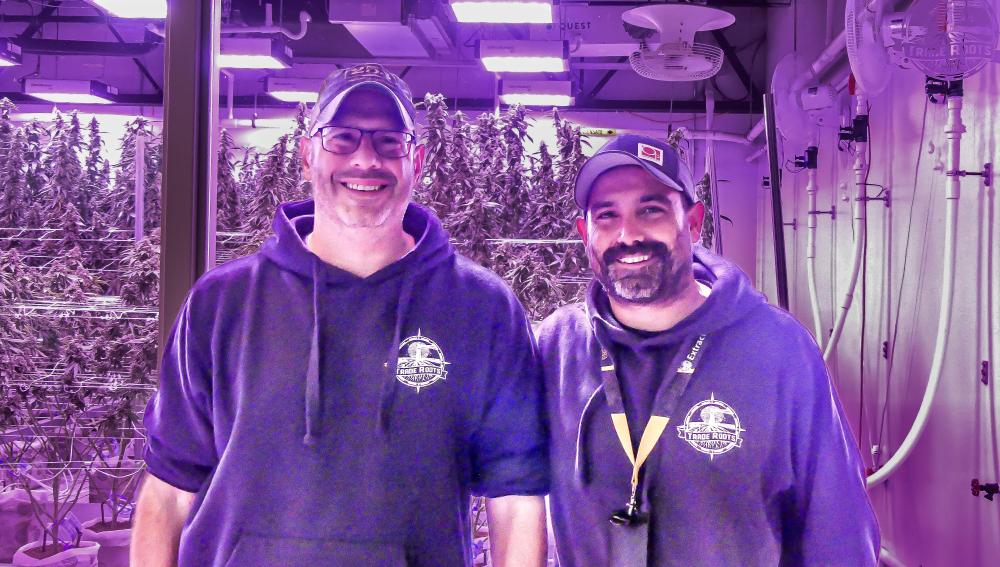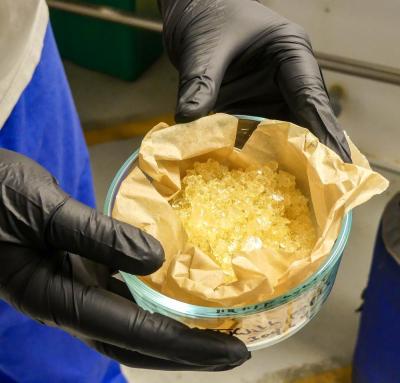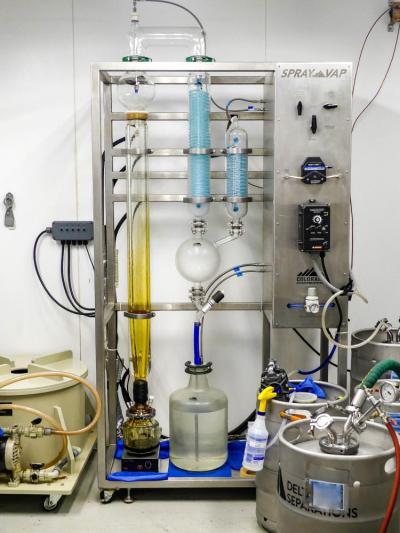Trade Roots navigates a new world for an old industry
Bright lights set to the “flowering phase” shine down on approximately 400 cannabis plants, mimicking the sunbeams of autumn through a tunable spectrum.
It’s almost time to harvest.
But the trimmings of these leafy greens won’t be going far.
This is one of three cultivation rooms in Trade Roots — a cannabis dispensary that opened for retail at 6 Thatcher Lane almost two years ago.
Inside the shop, a large window allows customers to peer into the showroom — the glass is 95% dimmed yet remains bright.
Jesse Pitts and Carl Giannone are the co-owners of Trade Roots — the first vertically integrated social equity operator in the state.
“Vertical integration” means Trade Roots not only plays a role in selling cannabis, but also in the cultivation and manufacturing of its products. As a “social equity operator,” the company has the advantage of being a part of the state’s Social Equity Program, which “the original purpose of that was to redress some of the harms caused by the War on Drugs,” Giannone explained.
Becoming the first
Back in 2007, Pitts was arrested on charges of drug trafficking and conspiracy to violate a controlled substance act after police raided a Norton home, seizing 70 pounds of marijuana, $218,860 cash and two vehicles among other evidence. Pitts had turned himself in and officers arrested two others.
Later on in life, Pitts met Giannone and they decided to start a cannabis business together. And after a trip to a farm in Oregon, Pitts realized where he wanted to go: home.
“To do this in my hometown is absolutely amazing because this is one of those areas that was ruled as disproportionately affected by the War on Drugs and I know many of those people who were,” Pitts said.
Since coming to town, Pitts and Giannone have made an effort to engage themselves with the community, according to Pitts.
He said the success of the business can be partially attributed to the support from the community and town.
He added this program is giving the people affected by the War on Drugs in Massachusetts a chance to give back to the communities they came from.
The Social Equity Program provides technical assistance and training to those individuals who are opening cannabis businesses.
“I was never really looking for a handout or anything like that,” Pitts said, “but it sort of … shines a light on the legacy market.”
“This is an industry that’s been around for a long time,” he added. “This is an industry transition.”
Pitts emphasized the difficulty many cannabis businesses face when getting started, especially in regard to licensing, of which Trade Roots needed to obtain multiple. He said he believes this is why their business is only one of two in the state to achieve this status so far.
However, the business’ status as vertically integrated “allowed us to really have a little bit more control and also offer more services,” Pitts said.
The art in science
When the plants are ready, Trade Roots staff will complete the harvest. Before being dried, the plant will be immediately put in a freezer to preserve the “terpenes,” according to Pitts.
Terpenes are naturally occurring chemical compounds that give the cannabis its aroma, taste and many of the drug’s effects.
Different terpenes have varying effects and scents, including truffle cake, skittles, garlic mushroom onion and grape gasoline crossed with apples and bananas.
Some of the plants are used to create other cannabis products, which is where Trade Roots’ lab comes in.
Pitts said, “It's a very unique room built for this industry with technology that was pre-existing, but not used for what we're using it for,” adding the fire marshall likened it to a “space station” during inspection.
“We can make some really fun, interesting products,” Pitts said.
Extraction is completed through one of two solvents: ethanol alcohol or a hydrocarbon, such as butane. These extractions produce an oil that will need to be further distilled of impurities.
One side of the lab is what Giannone has coined “pure science” and the other side is where science and art blend.
The art side of the lab is where the creativity comes in for developing products, including THCa cannabinoid stones also known as “diamonds” due to its similarities to the gemstone.
In October, Vice President of Production Spencer Holleran had a batch of diamonds made from the impurities of oil extracted using the hydrocarbon pentane as a solvent.
He said the diamonds develop when those impurities are stored in a jar and the THCa “crashes out,” meaning the cannabinoid separates itself from the rest of the other elements in the extraction. Once tested, these diamonds can then be smoked or vaped.
Setting precedent
“We’re a very odd duck,” Giannone said.
The co-owners aimed to develop a brewery-like set up as opposed to a convenience store.
The cultivation and manufacturing side of the business started up in July 2021. The retail side of the shop opened up in February 2022. Trade Roots also has a number of partners for wholesale and trading, according to its website.
Giannone said the business did face some difficulty when their expected profit margins changed, for causes including inflation.
He explained two kilos of distillate was at one point worth approximately $50,000 — 18 months later, its value hit a low of around $3,000 and it now sits at about $10,000. In addition, flower prices compressed by 60%.
“The prices and the value of the product did not hold true for us, but that doesn't mean we didn't do what we said we could do,” Pitts said. “We did accomplish the mission that we set out to do, which was to build a full vertical social equity company.”
For Giannone and Pitts, this status means setting a precedent for future social equity operators.
Pitts said the program has given himself and others affected by the War on Drugs a voice and a “seat at the table.”
Through creative control over their own products, the two are able to combine old insight and industry knowledge with current resources, practices and technology.
This work and the company’s relationship with the community has all been a part of the owners’ effort in “legitimizing this industry and moving it forward into the right direction,” Pitts said.

















